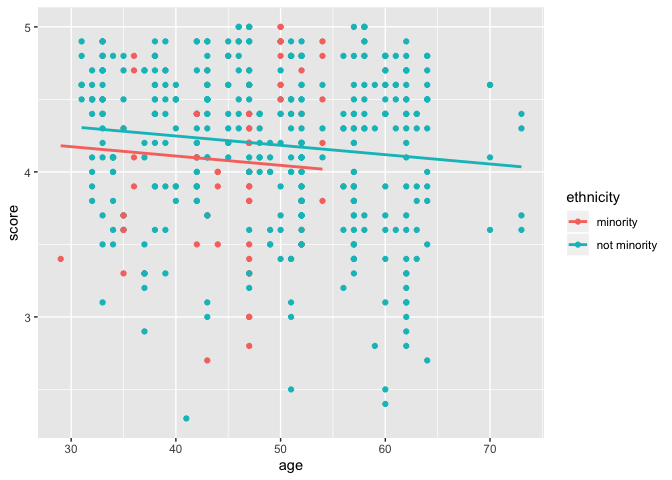An R package of datasets and wrapper functions for tidyverse-friendly introductory linear regression used in "Statistical Inference via Data Science: A ModernDive into R and the Tidyverse"" available at ModernDive.com.
Get the released version from CRAN:
install.packages("moderndive")Or the development version from GitHub:
# If you haven't installed remotes yet, do so:
# install.packages("remotes")
remotes::install_github("moderndive/moderndive")Let’s fit a simple linear regression of teaching score (as evaluated
by students) over instructor age for 463 courses taught by 94
instructors at the UT Austin:
library(moderndive)
score_model <- lm(score ~ age, data = evals)Among the many useful features of the moderndive package outlined in
our essay “Why should you use the moderndive package for intro linear
regression?”
we highlight three functions in particular as covered there.
We also mention the geom_parallel_slopes() function as #4.
Get a tidy regression table with confidence intervals:
get_regression_table(score_model)## # A tibble: 2 x 7
## term estimate std_error statistic p_value lower_ci upper_ci
## <chr> <dbl> <dbl> <dbl> <dbl> <dbl> <dbl>
## 1 intercept 4.46 0.127 35.2 0 4.21 4.71
## 2 age -0.006 0.003 -2.31 0.021 -0.011 -0.001
Get information on each point/observation in your regression, including fitted/predicted values & residuals, organized in a single data frame with intuitive variable names:
get_regression_points(score_model)## # A tibble: 463 x 5
## ID score age score_hat residual
## <int> <dbl> <int> <dbl> <dbl>
## 1 1 4.7 36 4.25 0.452
## 2 2 4.1 36 4.25 -0.148
## 3 3 3.9 36 4.25 -0.348
## 4 4 4.8 36 4.25 0.552
## 5 5 4.6 59 4.11 0.488
## 6 6 4.3 59 4.11 0.188
## 7 7 2.8 59 4.11 -1.31
## 8 8 4.1 51 4.16 -0.059
## 9 9 3.4 51 4.16 -0.759
## 10 10 4.5 40 4.22 0.276
## # … with 453 more rows
Get all the scalar summaries of a regression fit included in
summary(score_model) along with the mean-squared error and root
mean-squared error:
get_regression_summaries(score_model)## # A tibble: 1 x 8
## r_squared adj_r_squared mse rmse sigma statistic p_value df
## <dbl> <dbl> <dbl> <dbl> <dbl> <dbl> <dbl> <dbl>
## 1 0.011 0.009 0.292 0.540 0.541 5.34 0.021 2
Plot parallel slopes regression models involving one categorical and one
numerical explanatory/predictor variable (something you cannot do using
ggplot2::geom_smooth()).
library(ggplot2)
ggplot(evals, aes(x = age, y = score, color = ethnicity)) +
geom_point() +
geom_parallel_slopes(se = FALSE)Want to output cleanly formatted tables in an R Markdown document? Just
add print = TRUE to any of the three get_regression_*()
functions.
get_regression_table(score_model, print = TRUE)| term | estimate | std_error | statistic | p_value | lower_ci | upper_ci |
|---|---|---|---|---|---|---|
| intercept | 4.462 | 0.127 | 35.195 | 0.000 | 4.213 | 4.711 |
| age | -0.006 | 0.003 | -2.311 | 0.021 | -0.011 | -0.001 |
Want to apply your fitted model on new data to make predictions? No
problem! Include a newdata data frame argument to
get_regression_points().
For example, the Kaggle.com practice competition House Prices: Advanced
Regression
Techniques
requires you to fit/train a model to the provided train.csv training
set to make predictions of house prices in the provided test.csv test
set. The following code performs these steps and outputs the predictions
in submission.csv:
library(tidyverse)
library(moderndive)
# Load in training and test set
train <- read_csv("https://github.com/moderndive/moderndive/raw/master/vignettes/train.csv")
test <- read_csv("https://github.com/moderndive/moderndive/raw/master/vignettes/test.csv")
# Fit model
house_model <- lm(SalePrice ~ YrSold, data = train)
# Make and submit predictions
submission <- get_regression_points(house_model, newdata = test, ID = "Id") %>%
select(Id, SalePrice = SalePrice_hat)
write_csv(submission, "submission.csv")The resulting submission.csv is formatted such that it can be
submitted on Kaggle, resulting in a “root mean squared logarithmic
error” leaderboard score of
0.42918.
The three get_regression functions are wrappers of functions from the
broom
package for converting statistical analysis objects into tidy tibbles
along with a few added tweaks:
get_regression_table()is a wrapper forbroom::tidy()get_regression_points()is a wrapper forbroom::augment()get_regression_summaries()is a wrapper forbroom::glance()
Why did we create these wrappers?
- The
broompackage function namestidy(),augment(), andglance()don’t mean anything to intro stats students, where as themoderndivepackage function namesget_regression_table(),get_regression_points(), andget_regression_summaries()are more intuitive. - The default column/variable names in the outputs of the above 3
functions are a little daunting for intro stats students to
interpret. We cut out some of them and renamed many of them with
more intuitive names. For example, compare the outputs of the
get_regression_points()wrapper function and the parentbroom::augment()function.
get_regression_points(score_model)## # A tibble: 463 x 5
## ID score age score_hat residual
## <int> <dbl> <int> <dbl> <dbl>
## 1 1 4.7 36 4.25 0.452
## 2 2 4.1 36 4.25 -0.148
## 3 3 3.9 36 4.25 -0.348
## 4 4 4.8 36 4.25 0.552
## 5 5 4.6 59 4.11 0.488
## 6 6 4.3 59 4.11 0.188
## 7 7 2.8 59 4.11 -1.31
## 8 8 4.1 51 4.16 -0.059
## 9 9 3.4 51 4.16 -0.759
## 10 10 4.5 40 4.22 0.276
## # … with 453 more rows
library(broom)
augment(score_model)## # A tibble: 463 x 9
## score age .fitted .se.fit .resid .hat .sigma .cooksd .std.resid
## <dbl> <int> <dbl> <dbl> <dbl> <dbl> <dbl> <dbl> <dbl>
## 1 4.7 36 4.25 0.0405 0.452 0.00560 0.542 0.00197 0.837
## 2 4.1 36 4.25 0.0405 -0.148 0.00560 0.542 0.000212 -0.274
## 3 3.9 36 4.25 0.0405 -0.348 0.00560 0.542 0.00117 -0.645
## 4 4.8 36 4.25 0.0405 0.552 0.00560 0.541 0.00294 1.02
## 5 4.6 59 4.11 0.0371 0.488 0.00471 0.541 0.00193 0.904
## 6 4.3 59 4.11 0.0371 0.188 0.00471 0.542 0.000288 0.349
## 7 2.8 59 4.11 0.0371 -1.31 0.00471 0.538 0.0139 -2.43
## 8 4.1 51 4.16 0.0261 -0.0591 0.00232 0.542 0.0000139 -0.109
## 9 3.4 51 4.16 0.0261 -0.759 0.00232 0.541 0.00229 -1.40
## 10 4.5 40 4.22 0.0331 0.276 0.00374 0.542 0.000488 0.510
## # … with 453 more rows
Please note that this project is released with a Contributor Code of Conduct. By participating in this project you agree to abide by its terms.




